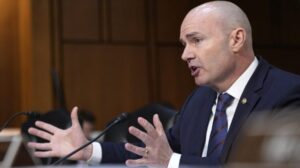Congress
Elon Musk renews megabill attacks
Elon Musk is once again bashing the Republican megabill.
Weeks after an initial tirade against the legislation, the former top White House staffer and current richest man in the world wrote Saturday on X that the “latest Senate draft bill will destroy millions of jobs in America and cause immense strategic harm to our country!”
“Utterly insane and destructive,” he added. “It gives handouts to industries of the past while severely damaging industries of the future.”
The bill significantly cuts subsidies for clean power sources like wind and solar, along with tax credits for buying electric vehicles and instead includes incentives for the coal industry.
Musk has intervened before to tank a major spending bill. The billionaire torpedoed a compromise government spending bill in December by repeatedly posting in opposition to it. This caused a number of Republicans to back away and nearly spaked a government shutdown.
At the time, Musk had far more influence as a close Trump ally and as the largest donor in support of Trump’s re-election bid. His influence in the GOP has waned after his controversial stint atop the Department of Government Efficiency initiative created repeated hassles for the White House.
Congress
Trump threatens Tillis with primary challenge
President Donald Trump said he would explore backing a primary challenger to two-term Sen. Thom Tillis Saturday — just hours after the North Carolina Republican voted against advancing the centerpiece of Trump’s legislative agena.
Trump berated Tillis in mutiple Truth Social posts, saying he was making a “big mistake” and that he would be meeting potential primary challenges as he was “looking for someone who will properly represent the Great People of North Carolina.”
Tillis has long expressed concerns about the impact of Medicaid changes in the bill on North Carolina and said Saturday he would not support the legislation unless changes are made. Trump did not mention the issue in his posts, but did detail Tillis’ earlier concerns with preserving some clean-energy tax breaks that Republicans are targeting.
North Carolina is the top pickup opportunity for Senate Democrats in 2026, and Tillis is a veteran of multiple tough races in the Tarheel State. In 2014, as speaker of the state House, he knocked off incumbent Kay Hagan in one of the closest Senate races of the cycle. Tillis then won narrowly in 2020 after his Democrat opponent, former state Sen. Cal Cunningham, got himself embroiled in a sexting scandal.
Tillis was already anticipating facing a strong Democratic opponent next year: Former Rep. Wiley Nickel has already announced a Senate bid, and popular former Gov. Roy Cooper is also mulling a run.
Congress
Megabill in limbo with GOP senators locked in last-minute talks
A Senate vote on advancing Republicans’ party-line domestic-policy bill has been held open for more than two hours as GOP leaders scramble for the final votes.
Vice President JD Vance arrived at the Capitol shortly after 8 p.m. to break a possible tie. Three Republican senators — Ron Johnson of Wisconsin, Rand Paul of Kentucky and Thom Tillis of North Carolina — have already voted “no.” A fourth GOP opponent would at least temporarily sink the megabill and likely foil plans to get it to President Donald Trump’s desk by July 4.
Senate Majority Leader John Thune, Majority Whip John Barrasso, Finance Chair Mike Crapo and Budget Chair Lindsey Graham are meeting off the floor with Vance, Johnson and the three Republican holdouts — Sens. Mike Lee of Utah, Cynthia Lummis of Wyoming and Rick Scott of Florida. The three are believed to be voting as a bloc; Lee and Scott have raised concerns about the level of spending cuts in the bill.
“We need more deficit reduction,” Lee said before the vote. Notably, he announced Saturday night he was dropping a provision to sell some public lands from the megabill amid intraparty opposition.
Thune was tight-lipped heading into the meeting saying only, “It’s a long vote.”
Earlier in the evening, Sen. Lisa Murkowski of Alaska made her fellow Republicans sweat, withholding her vote for nearly an hour while a gaggle of key leaders surrounded her on the Senate floor.
Murkowski, who had already secured major concessions for her home state, spent more than a half-hour in deep and sometimes animated conversations with Crapo, Graham, Barrasso and Thune, also talking separately to Sens. Bill Cassidy of Louisiana and John Curtis of Utah. At one point she held Vance’s hand while she talked with him one-on-one in the back of the chamber.
Graham could be heard loudly saying that to “start the process” would be “best.” Eventually she voted to move forward with the bill, with a big smile, but only after she retreated into the cloakroom for additional conversations with leaders and committee chairs.
Lisa Kashinsky contributed to this report.
Congress
‘Kill shot’: GOP megabill targets solar, wind projects with new tax
Senate Republicans stepped up their attacks on U.S. solar and wind energy projects by quietly adding a provision to their megabill that would penalize future developments with a new tax.
That new tax measure was tucked into the more than 900-page document released late Friday that also would sharply cut the tax credits in the Inflation Reduction Act for solar and wind projects. Those cuts to the IRA credits were added after a late-stage push by President Donald Trump to crack down further on the incentives by requiring generation projects be placed in service by the end of 2027 to qualify.
The new excise tax is another blow to the fastest-growing sources of power production in the United States, and would be a massive setback to the wind and solar energy industries since it would apply even to projects not receiving any credits.
“It’s a kill shot. This new excise tax on wind and solar is designed to fully kill the industry,” said Adrian Deveny, founder and president of policy advisory firm Climate Vision, who helped craft the climate law as a former policy director for Democratic Senate Leader Chuck Schumer.
Analysts at the Rhodium Group said in an email the new tax would push up the costs of wind and solar projects by 10 to 20 percent — on top of the cost increases from losing the credits.
“Combined with the likely onerous administrative reporting burden this provision puts in place, these cost increases will lead to even lower wind and solar installations. The impacts of this tax would also flow through to consumers in the form of higher electricity rates,” Rhodium said.
The provision as written appears to add an additional tax for any wind and solar project placed into service after 2027 — when its eligibility for the investment and production tax credits ends — if a certain percentage of the value of the project’s components are sourced from prohibited foreign entities, like China. It would apply to all projects that began construction after June 16 of this year.
The language would require wind and solar projects, even those not receiving credits, to navigate complex and potentially unworkable requirements that prohibit sourcing from foreign entities of concern — a move designed to promote domestic production and crack down on Chinese materials.
In keeping with GOP support for the fossil fuel industry, the updated bill creates a new production tax credit for metallurgical coal, which is used in steelmaking.
-

 The Josh Fourrier Show8 months ago
The Josh Fourrier Show8 months agoDOOMSDAY: Trump won, now what?
-
Uncategorized8 months ago
Bob Good to step down as Freedom Caucus chair this week
-

 Politics8 months ago
Politics8 months agoWhat 7 political experts will be watching at Tuesday’s debate
-

 Politics8 months ago
Politics8 months agoHow Republicans could foil Harris’ Supreme Court plans if she’s elected
-
Economy8 months ago
Fed moves to protect weakening job market with bold rate cut
-
Economy8 months ago
It’s still the economy: What TV ads tell us about each campaign’s closing message
-

 Politics8 months ago
Politics8 months agoRFK Jr.’s bid to take himself off swing state ballots may scramble mail-in voting
-
Uncategorized8 months ago
Johnson plans to bring House GOP short-term spending measure to House floor Wednesday








